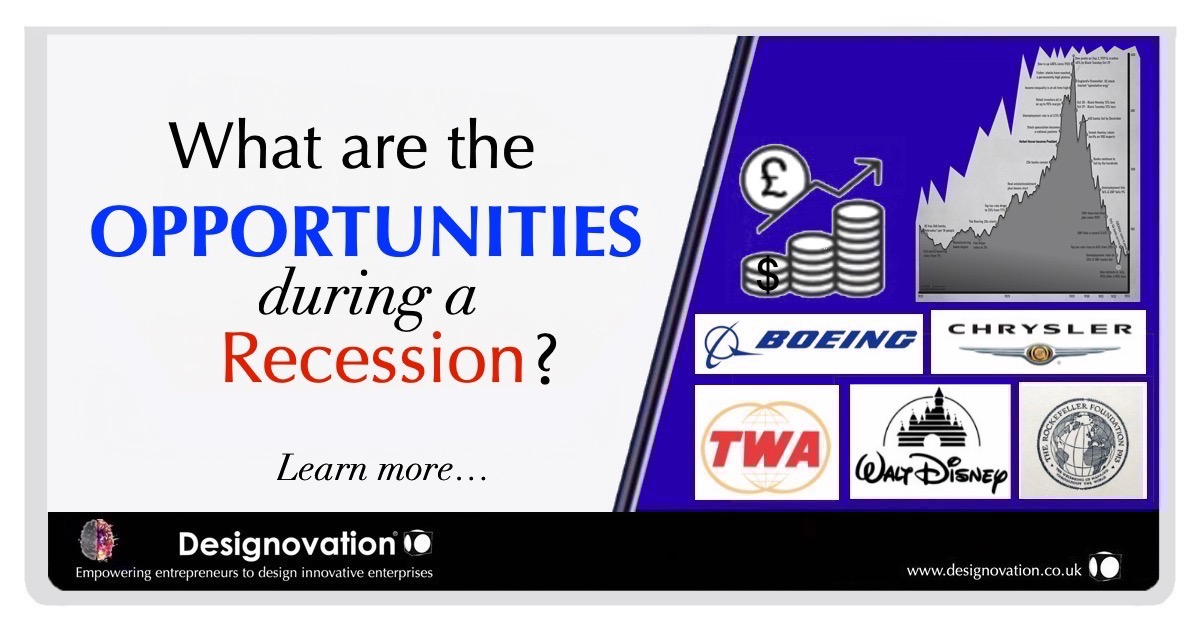Extract from ‘Prepare for Recession’ :Self Study Course
Recession Opportunities Workbooks
Throughout History there have been companies that have either thrived or propelled their businesses to the next level by taking advantage of the opportunities presented by a Recession.
Many understand that Recessions provide a period of natural evolution where underperforming, poorly managed or over leveraged businesses are weeded out.
And a time for business owners with sustainable, healthy businesses & balance sheets have their opportunity & time to flourish and grow.
There are some great examples of companies positively affected during both the Great Depression and various Recessions. Just a few of the companies that were founded during a Recession include: Wilko founded 1930, Hays Travel 1980, Sage Group 1981, JD Sports 1981, Poundland 1990, Pets at Home 1991, PC World 1991 to PureGym founded in 2008.
Companies launched or at start-up during the Great Depression included the American supermarket giant Publix, The Yellow Pages, Fortune Magazine, Walt Disney, Revlon & United Airlines.
During the great depression Procter & Gamble realised that even in a depression people would need soap. Likewise during the 1970’s with a period of soaring unemployment and inflation we saw the creation of the UK’s largest bike manufacturer ‘Brompton Bikes’.
The question is; How can you become one of those Companies, Business models
or Brands with a winning product or service
During a Recession?
Case I: Leverage

Walt Disney Rockefeller
During the Great Depression of 1929 many individuals made their Historical wealth by leveraging power, influence and taking advantage of high unemployment & a scarcity of cash (investment).
13 million people were unemployed in the U.S industrial production fell 45%, homebuilding by 80%, 5,000 banks had failed, the stock market had lost almost 90% of its value, and over a million families had lost their farms.

The Great Depression began in 1929 and lasted until about 1939, it was the longest and most severe depression ever experienced by the industrialised Western world.
Certain entrepreneurs saw the depression as an opportunity to expand their enterprises and personal wealth focusing on products & services still in demand.
In the midst of the economic crisis, John D. Rockefeller was able to negotiate favourable contracts with the railroad companies. This gave him discounted rates for transporting his oil, & major advantage over his competitors.
During this time Walt Disney produced the first ever full-length animated musical feature at the cost of $1,499,000.
The creation of Mickey Mouse gave the American people a symbol of hope ‘Light at the end of the tunnel’ keeping the Disney company buoyant during the most financially challenging periods of U.S History.
Case II: Go Big or Go Home!

The movie ‘The Aviator’ depicting the life of Howard Hughes is a great example of an entrepreneur & innovator that used an economic downturn to achieve their business & financial goals due to his access to cash & funding.
Recessions can often be over looked if companies have products or services that are instrumental in a major innovation or technological shift. In the 1930’s this included Titans William Boeing & Walter Chrysler – Boeing emerging with the launch of the aviation industry & passenger travel. Vehicle manufacturers Chrysler capitalising on the sale of their affordable cheaper ‘Plymouth’ brand.
Howard Hughes inherited a fortune at 18 years old funding his successful Hollywood movies ‘Hell’s Angels’ etc. During the great Depression he purchased TWA (Trans World Airlines) and formed the Hughes Aircraft Company. Becoming one of the most profitable aircraft manufacturers and breaking the transcontinental speed record in 1936.
In my book ‘The Entrepreneur’ I describe the 5th characteristic of a Great Entrepreneur as ‘The Gambler’. This is an instinct and characteristic every great business owner should possess. I describe in my book the Gambler not as a reckless risk taker but a shrewd & educated business person that understands both finances and their specialist industry.
If you are an innovator, technician and specialist with a unique product and service in the emerging markets of A.I, Automation, Software, Technology or a traditional sector with opportunities to reinvent & modernise- an Economic downturn may be of no consequence to you if can obtain the relevant funding, investment and cashflow………………………..
Basic Questions:


